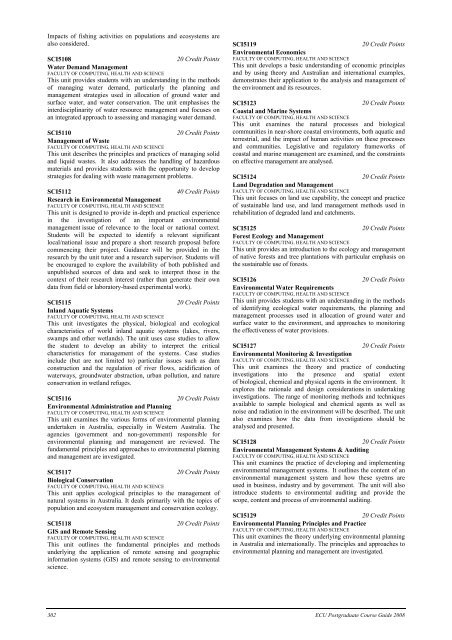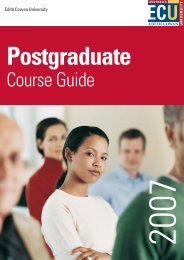Postgraduate - Edith Cowan University
Postgraduate - Edith Cowan University
Postgraduate - Edith Cowan University
You also want an ePaper? Increase the reach of your titles
YUMPU automatically turns print PDFs into web optimized ePapers that Google loves.
Impacts of fishing activities on populations and ecosystems are<br />
also considered.<br />
SCI5108 20 Credit Points<br />
Water Demand Management<br />
FACULTY OF COMPUTING, HEALTH AND SCIENCE<br />
This unit provides students with an understanding in the methods<br />
of managing water demand, particularly the planning and<br />
management strategies used in allocation of ground water and<br />
surface water, and water conservation. The unit emphasises the<br />
interdisciplinarity of water resource management and focuses on<br />
an integrated approach to assessing and managing water demand.<br />
SCI5110 20 Credit Points<br />
Management of Waste<br />
FACULTY OF COMPUTING, HEALTH AND SCIENCE<br />
This unit describes the principles and practices of managing solid<br />
and liquid wastes. It also addresses the handling of hazardous<br />
materials and provides students with the opportunity to develop<br />
strategies for dealing with waste management problems.<br />
SCI5112 40 Credit Points<br />
Research in Environmental Management<br />
FACULTY OF COMPUTING, HEALTH AND SCIENCE<br />
This unit is designed to provide in-depth and practical experience<br />
in the investigation of an important environmental<br />
management issue of relevance to the local or national context.<br />
Students will be expected to identify a relevant significant<br />
local/national issue and prepare a short research proposal before<br />
commencing their project. Guidance will be provided in the<br />
research by the unit tutor and a research supervisor. Students will<br />
be encouraged to explore the availability of both published and<br />
unpublished sources of data and seek to interpret those in the<br />
context of their research interest (rather than generate their own<br />
data from field or laboratory-based experimental work).<br />
SCI5115 20 Credit Points<br />
Inland Aquatic Systems<br />
FACULTY OF COMPUTING, HEALTH AND SCIENCE<br />
This unit investigates the physical, biological and ecological<br />
characteristics of world inland aquatic systems (lakes, rivers,<br />
swamps and other wetlands). The unit uses case studies to allow<br />
the student to develop an ability to interpret the critical<br />
characteristics for management of the systems. Case studies<br />
include (but are not limited to) particular issues such as dam<br />
construction and the regulation of river flows, acidification of<br />
waterways, groundwater abstraction, urban pollution, and nature<br />
conservation in wetland refuges.<br />
SCI5116 20 Credit Points<br />
Environmental Administration and Planning<br />
FACULTY OF COMPUTING, HEALTH AND SCIENCE<br />
This unit examines the various forms of environmental planning<br />
undertaken in Australia, especially in Western Australia. The<br />
agencies (government and non-government) responsible for<br />
environmental planning and management are reviewed. The<br />
fundamental principles and approaches to environmental planning<br />
and management are investigated.<br />
SCI5117 20 Credit Points<br />
Biological Conservation<br />
FACULTY OF COMPUTING, HEALTH AND SCIENCE<br />
This unit applies ecological principles to the management of<br />
natural systems in Australia. It deals primarily with the topics of<br />
population and ecosystem management and conservation ecology.<br />
SCI5118 20 Credit Points<br />
GIS and Remote Sensing<br />
FACULTY OF COMPUTING, HEALTH AND SCIENCE<br />
This unit outlines the fundamental principles and methods<br />
underlying the application of remote sensing and geographic<br />
information systems (GIS) and remote sensing to environmental<br />
science.<br />
SCI5119 20 Credit Points<br />
Environmental Economics<br />
FACULTY OF COMPUTING, HEALTH AND SCIENCE<br />
This unit develops a basic understanding of economic principles<br />
and by using theory and Australian and international examples,<br />
demonstrates their application to the analysis and management of<br />
the environment and its resources.<br />
SCI5123 20 Credit Points<br />
Coastal and Marine Systems<br />
FACULTY OF COMPUTING, HEALTH AND SCIENCE<br />
This unit examines the natural processes and biological<br />
communities in near-shore coastal environments, both aquatic and<br />
terrestrial, and the impact of human activities on these processes<br />
and communities. Legislative and regulatory frameworks of<br />
coastal and marine management are examined, and the constraints<br />
on effective management are analysed.<br />
SCI5124 20 Credit Points<br />
Land Degradation and Management<br />
FACULTY OF COMPUTING, HEALTH AND SCIENCE<br />
This unit focuses on land use capability, the concept and practice<br />
of sustainable land use, and land management methods used in<br />
rehabilitation of degraded land and catchments.<br />
SCI5125 20 Credit Points<br />
Forest Ecology and Management<br />
FACULTY OF COMPUTING, HEALTH AND SCIENCE<br />
This unit provides an introduction to the ecology and management<br />
of native forests and tree plantations with particular emphasis on<br />
the sustainable use of forests.<br />
SCI5126 20 Credit Points<br />
Environmental Water Requirements<br />
FACULTY OF COMPUTING, HEALTH AND SCIENCE<br />
This unit provides students with an understanding in the methods<br />
of identifying ecological water requirements, the planning and<br />
management processes used in allocation of ground water and<br />
surface water to the environment, and approaches to monitoring<br />
the effectiveness of water provisions.<br />
SCI5127 20 Credit Points<br />
Environmental Monitoring & Investigation<br />
FACULTY OF COMPUTING, HEALTH AND SCIENCE<br />
This unit examines the theory and practice of conducting<br />
investigations into the presence and spatial extent<br />
of biological, chemical and physical agents in the environment. It<br />
explores the rationale and design considerations in undertaking<br />
investigations. The range of monitoring methods and techniques<br />
available to sample biological and chemical agents as well as<br />
noise and radiation in the environment will be described. The unit<br />
also examines how the data from investigations should be<br />
analysed and presented.<br />
SCI5128 20 Credit Points<br />
Environmental Management Systems & Auditing<br />
FACULTY OF COMPUTING, HEALTH AND SCIENCE<br />
This unit examines the practice of developing and implementing<br />
environmental management systems. It outlines the content of an<br />
environmental management system and how these syetms are<br />
used in business, industry and by government. The unit will also<br />
introduce students to environmental auditing and provide the<br />
scope, content and process of environmental auditing.<br />
SCI5129 20 Credit Points<br />
Environmental Planning Principles and Practice<br />
FACULTY OF COMPUTING, HEALTH AND SCIENCE<br />
This unit examines the theory underlying environmental planning<br />
in Australia and internationally. The principles and approaches to<br />
environmental planning and management are investigated.<br />
302 ECU <strong>Postgraduate</strong> Course Guide 2008



